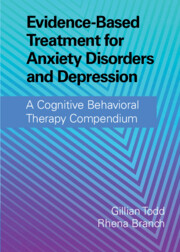 Evidence-Based Treatment for Anxiety Disorders and Depression
Evidence-Based Treatment for Anxiety Disorders and Depression The State of the Art
Published online by Cambridge University Press: 06 January 2022
This chapter discusses the philosophical and historical underpinnings of CBT. Attention is given to how CBT and REBT developed, and how these differ in terms of points of theory and intervention. Concepts such as ‘perfectionism’, ‘intolerance of uncertainty’, and ‘self-compassion’ are discussed regarding possible commonalities these approaches share with ideas posited by early theorists. Specific attention is given to Ellis’s ABC model of personality and how it is currently utilized within CBT. Recent developments within CBT such as ACT are included. Protocol-driven CBT and the possible implications for quality of CBT training (e.g., Improving Access to Psychological Treatments, UK training courses) are included.
To save this book to your Kindle, first ensure no-reply@cambridge.org is added to your Approved Personal Document E-mail List under your Personal Document Settings on the Manage Your Content and Devices page of your Amazon account. Then enter the ‘name’ part of your Kindle email address below. Find out more about saving to your Kindle.
Note you can select to save to either the @free.kindle.com or @kindle.com variations. ‘@free.kindle.com’ emails are free but can only be saved to your device when it is connected to wi-fi. ‘@kindle.com’ emails can be delivered even when you are not connected to wi-fi, but note that service fees apply.
Find out more about the Kindle Personal Document Service.
To save content items to your account, please confirm that you agree to abide by our usage policies. If this is the first time you use this feature, you will be asked to authorise Cambridge Core to connect with your account. Find out more about saving content to Dropbox.
To save content items to your account, please confirm that you agree to abide by our usage policies. If this is the first time you use this feature, you will be asked to authorise Cambridge Core to connect with your account. Find out more about saving content to Google Drive.